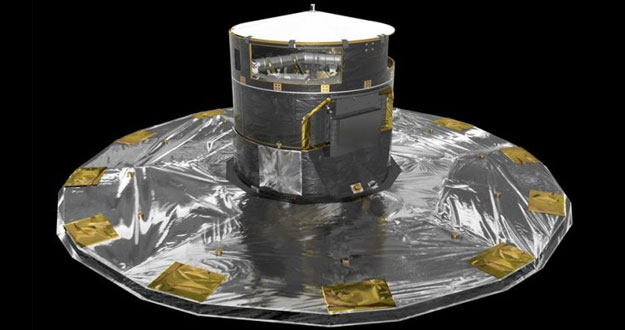Tomorrow, Thursday 19, the Gaia satellite of communications will be sent into space.
Several components of Gaia are from Spain, but there is one very special: a parasol.
A big 'parasol', manufactured in Spain to protect the satellite Gaia against the Star Solar System. This was reported by the European Space Agency (ESA), which will launch on December 19, from Kourou (French Guiana), aiming to census billion stars in the Milky Way.
Gaia is equipped with the largest digital camera ever built for a space mission, with a billion pixels, a giant eye that scrutinize and will map our galaxy and the results will mean, according to experts, a before and after for astronomy.
Its aim is to catalog one percent of all stars in the Milky Way and send information equivalent to nearly 45,000 DVDs of data, over the five year duration of the mission.
One of the tools that will enable the project is the parasol, ten meters in diameter, which will isolate the telescopes and will maintain them at a constant temperature of 170 degrees below zero.

Satelite Gaia
It is composed of two layers, thermal blankets, separated by about ten centimeters, each consisting of several very thin layers of different materials, such as aluminum or kapton. This umbrella will be deployed within three hours of the launch of Gaia and should be completely smooth to be effective.
To extend it will spend about nine minutes, as confirmed to Efe Diego Rodriguez, Director of Space and Defense of Sener and responsible of the parasol. "It is the first time, that it will be deployed in space at one time such a large parasol -125 kg-", he underlined.
Early work to make this parasol began in 2005. It has passed several tests in simulated zero gravity conditions and low temperatures, both in Spain (Alava) and Toulouse (France), until it has been integrated into Gaia and the rocket.
Gaia, also equipped with two telescopes with focal length of 35 meters and a spectrometer to calculate the radial velocity of the brightest stars, will reach the intended point in space (called L2) about four weeks after launch and will begin sending scientific data three or four months later.
Sener, who has also made the mechanisms focus of the telescope mirrors, is not the only Spanish company in Gaia: EADS-Astrium Crisa has made the electronic modules of the CCD; EADS-CASA Espacio has made the antenna and structure wiring and service module, and GMV is responsible, among others, test activities science operations center.
Spanish companies have exceeded the targets in terms of participation, typical 8.5% has gone to 11.5%, according to Rodriguez, for whom it is a "particularly Spanish" mission.
This is because the project "fit particularly well" with Spanish technology, since between 2000 and 2010, was given a boost by the Ministry of Industry sector, which increased the company training, he asserted .
To the engineer, due to cutbacks in the space sector, the best word that now defines the situation is "risk" and has opined that likely will be a "significant" decline in the sector's turn.
In the scientific section of Gaia, participate the University of Barcelona, the University of A Coruña, Valencia, Vigo, Alicante, moreover the National University of Distance Education, the Supercomputing Center in Barcelona, Catalonia Supercomputing, involved the Fundación Galileo Galilei Fundación Canaria, the Canary Islands Astrophysics Institute and the Space Science Institute .
I think that it is very interesting; Do not you think the same?. I also think that it is a pity that we are living a very deep crisis, that makes to cut back the budget for Science; it is really a pity, because in Spain we have many good scientists.
Till soon, kind regards,
Luis.
Sponsored by Costaluz Lawyers.
Please click down here:
